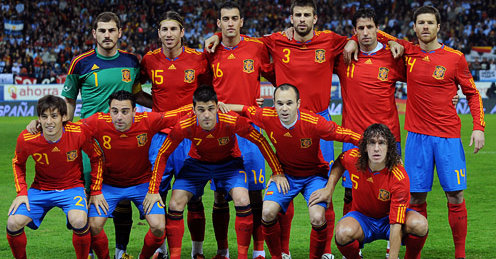Like the Roman and Greek gods and goddesses, the World Cup final sees two nations of football gods who share a similar history and a difference in style
If there were indeed a pantheon of gods playing football amongst us mere mortals, they had us fooled into thinking they were South Americans, epitomised in the rhythmic feet of Lionel Messi. For a brief moment, we were caught in the euphoria of Latin America lighting up the tournament in South Africa from Argentina, Brazil, Chile, Paraguay to Uruguay. We thought they already had their hands on the World Cup trophy.
This has been the story of the FIFA 2010 World Cup – the precariousness of supposedly predictable matches (Spain’s 1-0 opening match loss to Switzerland, a youthful Germany’s 1-0 loss to Serbia), the isolation and exile of pretentious gods (Cristiano Ronaldo, Wayne Rooney, Kaka) and the cries of the injustice (England’s disallowed goal over the line). The winds of change and unpredictability blow in every direction (like the Jabulani ball) and had every football fan tousled and dishevelled.
And so the fickle gods like to tease our weak minds. Turns out the gods were neither South American nor even the hyperbolic English, the latter inventors of football who disparaged the passing game into a kick and rush affair. These football gods whose touches caress the ball like silk covering every blade of grass on the field are in fact the Europeans, akin to their ancient Greek and Roman predecessors now immortalised into statues and paintings.
These gods, adorned in conspicuous robes of scarlet red and flaming orange, will spring forth from their long-drawn slumber and attempt to play the beautiful game in measured passes and hurried paces, in triangle setups and concentric dribbles, in blessed flair and consecrated technique, a divine and inspired display of attacking football, one with verve and another with patience.
Destiny calls on these gods hailing from Spain (or for the most part, Catalonia) and the Netherlands in Soccer City tonight to be held accountable for their immense talent and rich football culture that stoked the fires of every fan’s imagination but choked at the last hurdle in recent history.
Both teams stand divided in their pursuit of the World Cup for the first time ever but ironically, in the strangest twist of fate, these assembly of football idols share a similar history (like how the Greek and Roman gods and goddesses did) where paths once crossed, destinies altered and generations transformed.
The genesis began with a Dutch in a Spanish club. Rinus Michels, voted Coach of the Century by FIFA and inventor of Total Football, brought his tactics and adventurous football style to Nou Camp, home of Barcelona together with another Dutch legend Johan Cryuff.
From Nou Camp grounds rise the method and beauty of the passing game, the short passes, the languid pace, the total football that has been transformed into a cavalier style that more than 20 passes need to be played all over the field before putting the ball into the back of the net. This is tiki-taka football unleashed by the La Furia Roja (Spain’s nickname The Red Fury) at its hypnotic best – thanks to the Dutch no less.
And this is where the similarity stops between the two teams. For every rivalry, there are differences in the school of thought, a juxtaposition of styles and a contradiction of beliefs. The Dutch isn’t exactly playing the Total Football the Class of 74 led by Cryuff were famous and celebrated for. This time, the sense of adventure by the Oranje is somewhat stifled with a defensive mindset and the mind of a brute.
“I’d rather play an extremely ugly game and win,” said Arjen Robben. Mark van Bommel, the beast who body-checked players and intimidated referees, has escaped with a surprising total of just one yellow card booking so far in this tournament. He too, will try to unshackle creative midfield maestros like Xavi Hernandez and Andres Iniesta of Spain. Such is the new brand of Total Football approved by the Oranje Army, to attack like wild horses and undermine opponents like bulldozers.
Purist fans (this writer included) do not hope for aggression to prevail, which is inevitable as these football gods have nothing to lose except a fine line between infamy and damnation, triumph and the unbearable lightness of victory.
As the world watches tonight united and divided, we need to be reminded of the beautiful game, of how it should be played by the gods who are blessed with the skills to defend with resoluteness, to attack with panache, and most importantly, to thread exquisite passes from defence to midfield to attack seamlessly. And if the scarlet red of the Spanish pass masters were able to own the beautiful game tonight like how they did against the organised and fluid Germans, the La Furia Roja deserves to win.
Ronald Wan is a columnist and a freelance writer. And clearly a Spanish fan.
Follow our live text commentary on Twitter @theurbanwire
Read our match reports on our microsite at https://theurbanwire.sg/worldcup
Articles on FIFA 2010 World Cup:
2010 World Cup Referees: Simply Horrendous or Mere Scapegoats? – Nigel Low
Beginning of an End – Ronald Wan
Contenders Stake Their Claim – Nigel Low
World Cup Survivor Kit – Amiril Muhaimin


